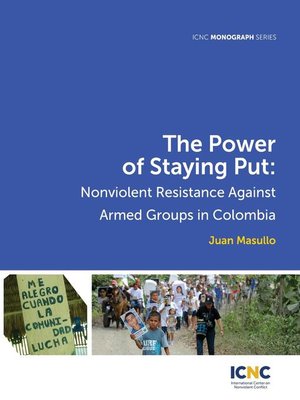The Power of Staying Put
ebook ∣ Nonviolent Resistance Against Armed Groups in Colombia · ICNC Monograph Series
By Juan Masullo

Sign up to save your library
With an OverDrive account, you can save your favorite libraries for at-a-glance information about availability. Find out more about OverDrive accounts.
Find this title in Libby, the library reading app by OverDrive.



Search for a digital library with this title
Title found at these libraries:
| Library Name | Distance |
|---|---|
| Loading... |
In irregular civil wars, armed groups strategically aim to conquer, preserve and control territories. Local civilians inhabiting these territories respond in a wide variety of forms. Although the two dominant responses seem to be to collaborate with the strongest actor in town or flee the area, civilians are not stuck with only these choices. Collectively defying armed groups by engaging in organized nonviolent forms of noncooperation, self-organization and disruption is another option. However, given unequal force, it is still unclear why ordinary unarmed civilians choose to defy fully armed opponents, let alone how they manage to coordinate and act collectively, and even achieve results that often go against the strategic interests of the armed groups.
This monograph examines this puzzle through a detailed case study of one instance of sustained and organized civil resistance led by ordinary peasants against state and non-state repressive actors in Colombia's longstanding civil war: the case of the Peace Community of San José de Apartadó (PCSJA). Building on interview and archival material collected during fieldwork, a dataset on civilian victimization, and secondary literature, this monograph describes and analyzes the emergence of the PCSJA, focusing on the key choices made to launch its civil resistance campaign; the methods of nonviolent action used; the evolution of peasants' preference for nonviolent organizing and noncooperation; and the capacity for collective action. An improved knowledge of this form of civil resistance can serve as a solid basis for the diffusion of these strategies both in other areas of Colombia and abroad, as well as for the design of post-conflict reconstruction strategies.







